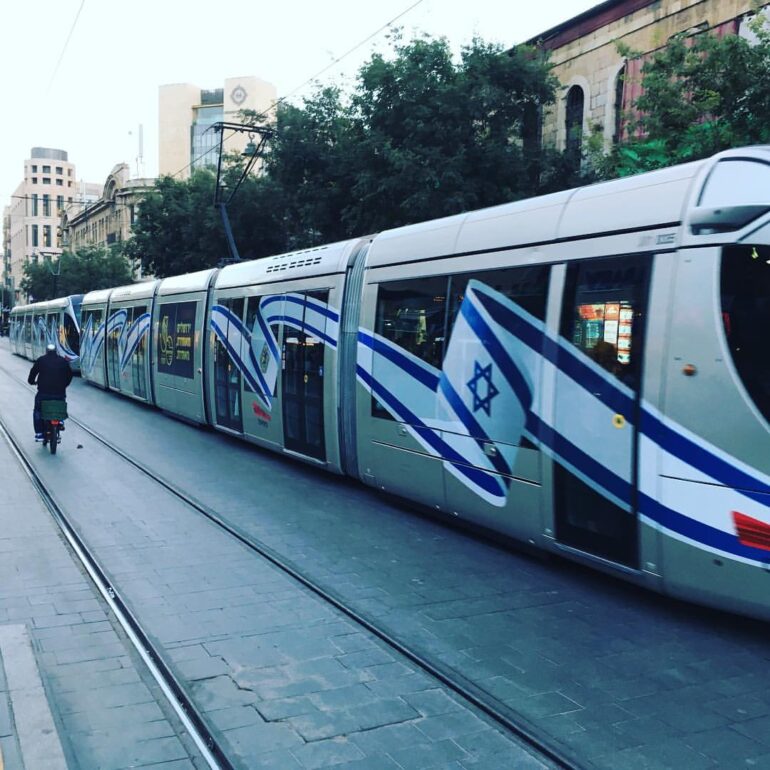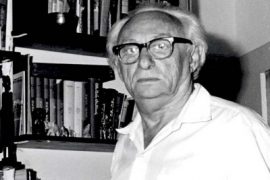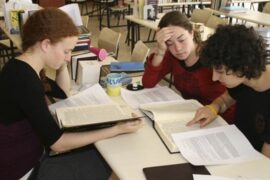I feel a strong emotional attachment to Hatikva. Singing it often chokes my voice. It may actually be more than an emotional attachment. I consider the song to be holy, having been sanctified by the Jewish martyrs who sang it on their way to British gallows when fighting to free our country from foreign rule.
Yet at the same time I know that the anthem speaks to a unique set of challenges and yearnings that [Ashkenazi] Jews once experienced in exile but have for the most part been resolved through the successes of the Zionist movement.
I also recognize that there are currently many people between the Mediterranean Sea and Jordan River who feel alienated by Israel’s national anthem and aren’t able to sing or in any way identify with it. And I recognize that in moving forward toward the next stage of realizing historic Jewish aspirations, we need to dig deeper into our rich ancient texts in order to find an anthem that can resonate with both our Ḥaredi and Palestinian populations, while still striking emotional chords within mainstream Israeli society.
What we need is an anthem that is simultaneously more Jewish and more inclusive to the non-Jew than Hatikva. And this is only one small example of the greater psychological shift necessary for advancing Jewish liberation.
Zionism has arguably been the most successful revolutionary movement to date. In the annals of human history, it is virtually unheard of for an ancient people, broken and scattered throughout the world for nearly 2,000 years, to return and reunite on its original native soil.
It is similarly unheard of for a people to revive a long-dead language to everyday use. The revival of Hebrew as a vernacular used in every area of society constitutes a revolution in itself, the magnitude of which has yet to be appreciated. Other peoples have vainly attempted to revive their extinct traditional tongues while the people of Israel speaks and creates in our own ancient language.
And although we are not the only people to ever win a struggle for freedom from British rule (according to official British sources, the empire withdrew from Palestine due to its inability to successfully contend with “Jewish terrorism”), the fact that Jews – as Jews existed in the 1940s – could achieve victory through armed struggle over one of that era’s mightiest empires really seems to me a triumph verging on the miraculous.
The situation of the Jewish people today is radically different than it was only a century ago. We have achieved the impossible. And we did so through a very necessary yet narrow Jewish nationalism called “Zionism” that currently appears to have outlived its usefulness.
If we define Zionism not as the Jewish struggle for liberation over millennia but as a late 19th/early 20th Century national movement that succeeded in returning the Jewish people to nationhood, then we are currently living in a post-Zionist reality where even the majority of self-defined Zionists in Israel understand the term to mean little more than Independence Day barbecues and reserve duty once a year. Few still approach Zionism as a doctrine with any aspirations for social or political change, because Zionism has already achieved all it can and the Jewish people are by and large ready and thirsty for something new.
In order to advance to the next stage, however, we need to shift away from our narrow Jewish nationalism in favor of a uniquely Hebrew universalism that reflects and expresses authentic Hebrew values while being more inclusive to non-Jewish groups in our society. We need to dig deeper into the wealth of our ancient sources in order to arrive at policies and structures that will at the same time make our country more Jewish, democratic and inclusive of the Other.
Hebrew Universalism shouldn’t be confused with Western universalism but should actually be seen as an alternative to it (that doesn’t demand uniformity under a superficial layer of cultural diversity). Because a conflict between the forces of Jewish nationalism and Western liberalism lies at the core of nearly every divisive socio-political issue in Israeli society, any post-Zionist Jewish liberation ideological tendency that aims to transcend this friction should be included in a broad tent of Hebrew Universalism. And just as Zionism had many theorists and ideological streams, so should Hebrew Universalism have a wide variety of political tendencies.
Advancing to the next stage of Jewish liberation doesn’t require that we shrink our nationalism or negate its achievements. The opposite. Our national consciousness needs to deepen and expand to the point that it explodes and spills over into universalism, transcending the either/or “Arab versus Jew” paradigm so we can make the State of Israel (from river to sea) both the fulfillment of historic Jewish aspirations and a genuine light unto nations that will benefit and inspire all humankind.
In exile, we essentially divided human beings into two categories – Jew and non-Jew – with the non-Jew often playing the role of our oppressor. But in ancient times, at periods when we enjoyed political independence, not every gentile assumed the role of an enemy. Just as there were multiple categories of Hebrews (Kohanim and the various tribes), there were also different categories that gentiles fell under. The Biblical narrative even tells us of a non-Hebrew heroine who killed the Canaanite General Sis’ra, ending two decades of brutal oppression. And over 3,000 years later, Jewish parents continue to name their daughters Yael.
Although Zionism’s successes have radically changed the reality of Jewish existence, our existential posture toward the non-Jew has essentially remained the same. Now that we have returned to a situation of political sovereignty, we need to transition our thinking away from that of a powerless people in exile. We need to think like an independent nation on its own soil. And part of our shift towards Hebrew Universalism requires us to realize that for the first time in millennia, Jews are ruling over a minority of gentiles, and to define what we believe to be the ideal role of a non-Jew in a Jewish society. Our very reluctance to even discuss this issue has caused untold suffering for both Jews and Palestinians. And it’s crucial to understand that realigning our attitude toward the Other cannot be accomplished through the narrow vehicle of European-style Jewish nationalism.
Transcending the zero-sum game with the Palestinians requires that we clarify for ourselves what the Jewish people have collectively wanted for thousands of years, and what itch of Jewish history the State of Israel is meant to scratch.
We need to ask ourselves whether the State of Israel is the goal of our revolution or perhaps merely a tool with which to accomplish that goal.
We have to define what it even means to have a “Jewish” state. Does it necessitate a Jewish majority? Or does it require policies and institutions that express inherent Jewish values (including how we treat the Other)?
What are the aspirations of most Palestinians? Do they conflict with our own? What is the ideal role of a non-Jew in a Jewish state and what gift do we see that state bestowing upon the world?
Our generation is challenged with transforming authentic Hebrew values into policies that include and empower the Other yet make our country more deeply Jewish in the process – by the very nature of the values they express. Participatory democracy, for example, is not only far more egalitarian than representative democracy. It is also more deeply rooted in authentic Jewish sources (“captains of ten” model).
Until now we’ve had a state that is externally Jewish. Superficial Jewish decorations slapped over a nation state structured on a European model. But in addition to offending and alienating non-Jews, these decorations aren’t “Jewish enough” for the Israelis most in touch with our people’s ancient traditions.
A state with a deep Jewish interior is preferable to one with a hard Jewish exterior. A state structured on the basis of authentic Hebrew values from the ground up would likely possess a confidence in its own “Jewishness” that would make offensive superficial decorations unnecessary while satisfying our ancient yearnings even more intensely.
The specific aspirations expressed by Hatikva have been realized. We should proudly recognize where we currently stand in Jewish history so that – without any concessions on the achievements of the past – we can advance and direct our energies toward the next stage of our revolution.
(Originally published in The Jerusalem Post)





